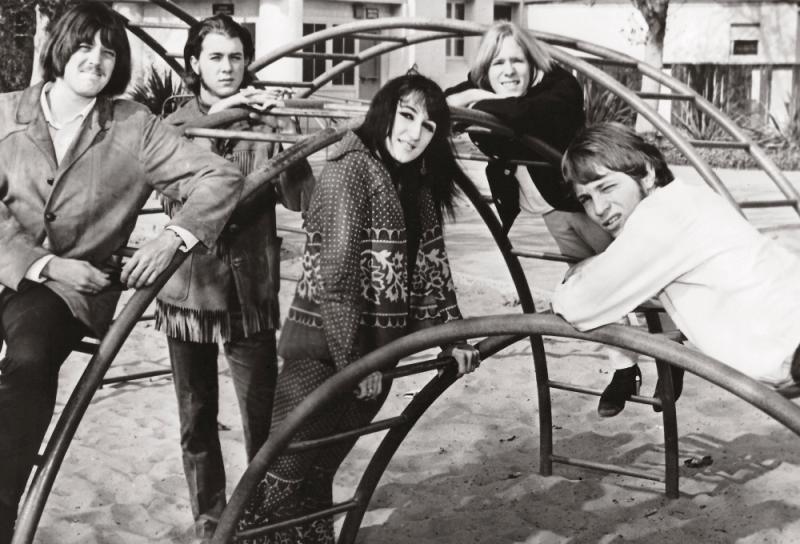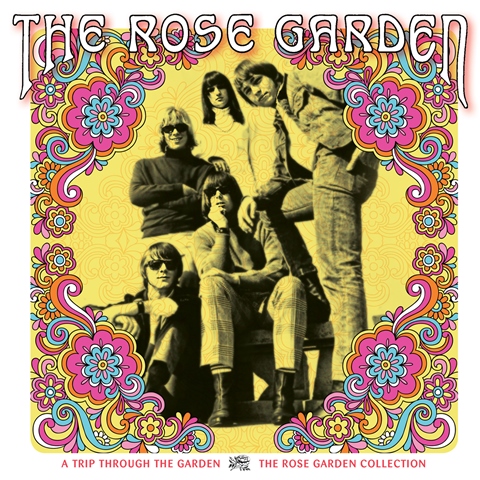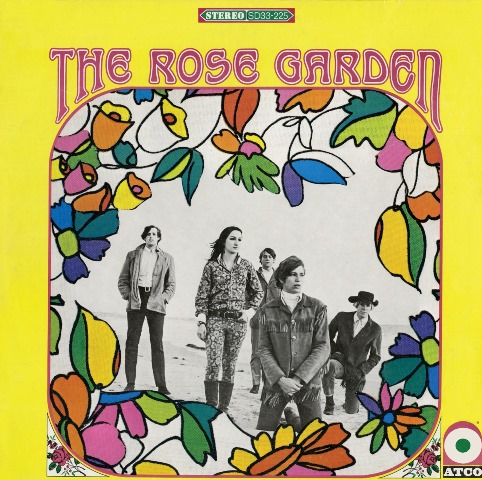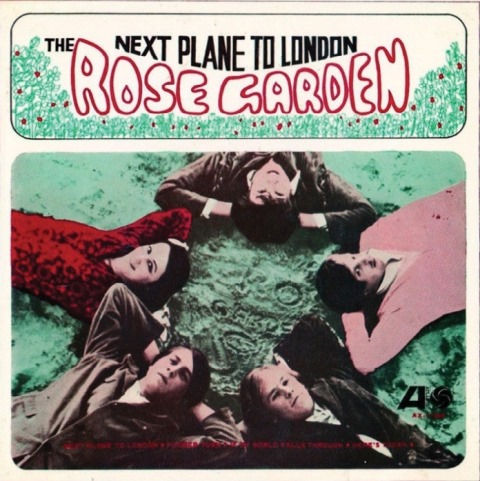Reissue CDs Weekly: The Rose Garden | reviews, news & interviews
Reissue CDs Weekly: The Rose Garden
Reissue CDs Weekly: The Rose Garden
‘A Trip Through The Garden’ charts the rise and fall of the fine, folky Californian harmony pop band

The Rose Garden didn’t linger in the bright lights but for those inclined towards harmony pop their name resonates due to the quality of their sole album rather than memories of them as a one-hit-wonder.
Interest in the album began picking up in the early Eighties after the realisation it included “Long Time” and “Till Today”, two otherwise unrecorded – and amazing – songs written by former Byrds member Gene Clark. There was also a version of “Rider” which, as “I Know My Rider”, had been recorded by The Byrds as a potential single. A scour of the album's credits revealed that its producers included Charles Greene and Brian Stone, who managed Sonny & Cher and The Buffalo Springfield. The Rose Garden appeared to have connections.
 Last week, this column looked at a collection of previously unissued demos recorded by Gene Clark which included tracks drawn from an acetate he had given to The Rose Garden’s lead guitarist/vocalist John Noreen. A Trip Through The Garden, a first-time Rose Garden anthology, is a companion piece to the Clark release and, as such, it illuminates the relationship and tells the band’s story.
Last week, this column looked at a collection of previously unissued demos recorded by Gene Clark which included tracks drawn from an acetate he had given to The Rose Garden’s lead guitarist/vocalist John Noreen. A Trip Through The Garden, a first-time Rose Garden anthology, is a companion piece to the Clark release and, as such, it illuminates the relationship and tells the band’s story.
A Trip Through The Garden includes the ten tracks from The Rose Garden, the band’s non-album A- and B-sides, previously unheard studio recordings, demos, live tracks and a band rehearsal of “Till Today” which was, extraordinarily, taped in Noreen’s bedroom with Gene Clark.
In the liner notes, The Rose Garden is described as “steeped in jingle-jangle Byrdsy folk rock (done well but arguably passé by 1968) and lush folk-inspired vocal harmonies” which nails it. The band were not writers – though they took arrangement credits for the folk songs “Flower Town” (their rewrite of “Portland Town”) and “Rider”.
 The Rose Garden (pictured left) hangs together and is a prime example of West Coast pop of the period. Nonetheless it was, indeed, a little behind the times. A fair guess for a release date made after hearing the album for the first time would be Summer 1967: an assumption supported by the very 1967 song title “Flower Town” and the cover of The Giant Sunflower’s April 1967 single “February Sunshine”. Even so, five decades on it remains a fresh, winning album.
The Rose Garden (pictured left) hangs together and is a prime example of West Coast pop of the period. Nonetheless it was, indeed, a little behind the times. A fair guess for a release date made after hearing the album for the first time would be Summer 1967: an assumption supported by the very 1967 song title “Flower Town” and the cover of The Giant Sunflower’s April 1967 single “February Sunshine”. Even so, five decades on it remains a fresh, winning album.
What led up to it being recorded, the deal with Greene and Stone and the contract with ATCO (also The Buffalo Springfield and Sonny & Cher’s label) is detailed. The roots of The Rose Garden lay in the suburbs outside Los Angeles (not West Virginia as has been said elsewhere) and in a band variously named The Marauders, The PF Flyers and the magnificently handled The Blokes: the latter after a line in Herman’s Hermits’ “Mrs. Brown You’ve Got A Lovely Daughter”. Initially, The Beatles were the inspiration, especially the Rickenbacker guitar sound permeating the A Hard Day’s Night album.
 Then, The Byrds arrived on the scene and swiftly became The Blokes’ prime influence. A Trip Through The Garden’s live tracks include fine versions of “She Don’t Care About Time” and “So You Want To Be A Rock ’N’ Roll Star”. Playing a late 1966 afternoon show at the Ash Grove venue, they saw the by-then former Byrd Gene Clark at the bar. They did a few Byrds covers, he applauded and was duly invited onto the stage where they ran-through “I’ll Feel A Whole Lot Better” and “‘Eight Miles High” with him. The relationship with Clark did not end there and, ultimately, the band recorded a pair of his post-Byrds songs. (pictured right: the Australian issue of "Next Plane To London")
Then, The Byrds arrived on the scene and swiftly became The Blokes’ prime influence. A Trip Through The Garden’s live tracks include fine versions of “She Don’t Care About Time” and “So You Want To Be A Rock ’N’ Roll Star”. Playing a late 1966 afternoon show at the Ash Grove venue, they saw the by-then former Byrd Gene Clark at the bar. They did a few Byrds covers, he applauded and was duly invited onto the stage where they ran-through “I’ll Feel A Whole Lot Better” and “‘Eight Miles High” with him. The relationship with Clark did not end there and, ultimately, the band recorded a pair of his post-Byrds songs. (pictured right: the Australian issue of "Next Plane To London")
Following their initial encounter with Clark, the all-male, mostly teenage band added singer Diana De Rose, attracted Green and Stone’s attention and changed their name from The Blokes to The Rose Garden. Despite the infrastructure now surrounding them, they had just the one hit. Clark joining them in the studio to help record his compositions, play tambourine and offer advice did not help. Neither did the presence of Neil Young, also there when they recorded the album (he is not on it). Their strong version of Young’s then-unreleased “Down To The Wire” is heard here for the first time. The end came soon after ATCO divisively credited one of their singles to “The Rose Garden Featuring Diana De Rose.”
Listening to this fine band raises the what-if of whether they might have evolved into a self-determining unit: could they have begun generating their own songs? But the question is moot. The Rose Garden were what they were, and the music they left behind is uniformly great. And, as the hugely enjoyable A Trip Through The Garden amply demonstrates, they were about much more than “Next Plane To London”.
- Next week: Metal box sets – Winds Of Time: The New Wave Of British Heavy Metal 1979–1985 and Contract In Blood: A History Of UK Thrash Metal
Explore topics
Share this article
The future of Arts Journalism
You can stop theartsdesk.com closing!
We urgently need financing to survive. Our fundraising drive has thus far raised £49,000 but we need to reach £100,000 or we will be forced to close. Please contribute here: https://gofund.me/c3f6033d
And if you can forward this information to anyone who might assist, we’d be grateful.

Subscribe to theartsdesk.com
Thank you for continuing to read our work on theartsdesk.com. For unlimited access to every article in its entirety, including our archive of more than 15,000 pieces, we're asking for £5 per month or £40 per year. We feel it's a very good deal, and hope you do too.
To take a subscription now simply click here.
And if you're looking for that extra gift for a friend or family member, why not treat them to a theartsdesk.com gift subscription?
more New music
 Album: Solar Eyes - Live Freaky! Die Freaky!
Psychedelic indie dance music with a twinkle in its eye
Album: Solar Eyes - Live Freaky! Die Freaky!
Psychedelic indie dance music with a twinkle in its eye
 Album: Night Tapes - portals//polarities
Estonian-voiced, London-based electro-popsters debut album marks them as one to watch for
Album: Night Tapes - portals//polarities
Estonian-voiced, London-based electro-popsters debut album marks them as one to watch for
 Album: Mulatu Astatke - Mulatu Plays Mulatu
An album full of life, coinciding with a 'farewell tour'
Album: Mulatu Astatke - Mulatu Plays Mulatu
An album full of life, coinciding with a 'farewell tour'
 Music Reissues Weekly: Sly and the Family Stone - The First Family: Live At Winchester Cathedral 1967
Must-have, first-ever release of the earliest document of the legendary soul outfit
Music Reissues Weekly: Sly and the Family Stone - The First Family: Live At Winchester Cathedral 1967
Must-have, first-ever release of the earliest document of the legendary soul outfit
 Album: Robert Plant - Saving Grace
Mellow delight from former Zep lead
Album: Robert Plant - Saving Grace
Mellow delight from former Zep lead
 Brìghde Chaimbeul, Round Chapel review - enchantment in East London
Inscrutable purveyor of experimental Celtic music summons creepiness and intensity
Brìghde Chaimbeul, Round Chapel review - enchantment in East London
Inscrutable purveyor of experimental Celtic music summons creepiness and intensity
 Album: NewDad - Altar
The hard-gigging trio yearns for old Ireland – and blasts music biz exploitation
Album: NewDad - Altar
The hard-gigging trio yearns for old Ireland – and blasts music biz exploitation
 First Person: Musician ALA.NI on how thoughts of empire and reparation influenced a song
She usually sings about affairs of the heart - 'TIEF' is different, explains the star
First Person: Musician ALA.NI on how thoughts of empire and reparation influenced a song
She usually sings about affairs of the heart - 'TIEF' is different, explains the star
 Album: The Divine Comedy - Rainy Sunday Afternoon
Neil Hannon takes stock, and the result will certainly keep his existing crowd happy
Album: The Divine Comedy - Rainy Sunday Afternoon
Neil Hannon takes stock, and the result will certainly keep his existing crowd happy
 Music Reissues Weekly: Robyn - Robyn 20th-Anniversary Edition
Landmark Swedish pop album hits shops one more time
Music Reissues Weekly: Robyn - Robyn 20th-Anniversary Edition
Landmark Swedish pop album hits shops one more time
 Album: Twenty One Pilots - Breach
Ohio mainstream superstar duo wrap up their 10 year narrative
Album: Twenty One Pilots - Breach
Ohio mainstream superstar duo wrap up their 10 year narrative
 Album: Ed Sheeran - Play
A mound of ear displeasure to add to the global superstar's already gigantic stockpile
Album: Ed Sheeran - Play
A mound of ear displeasure to add to the global superstar's already gigantic stockpile

Add comment